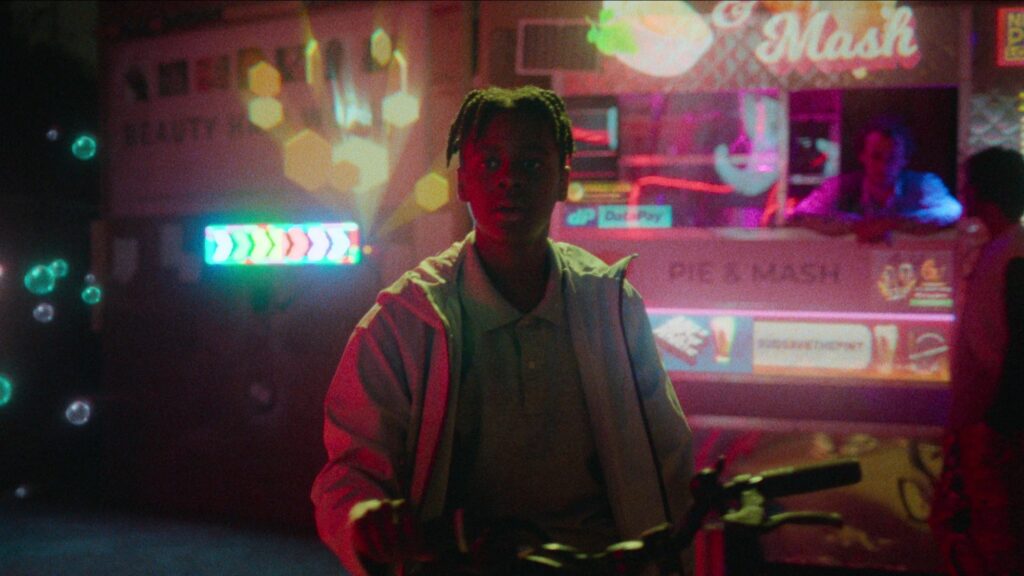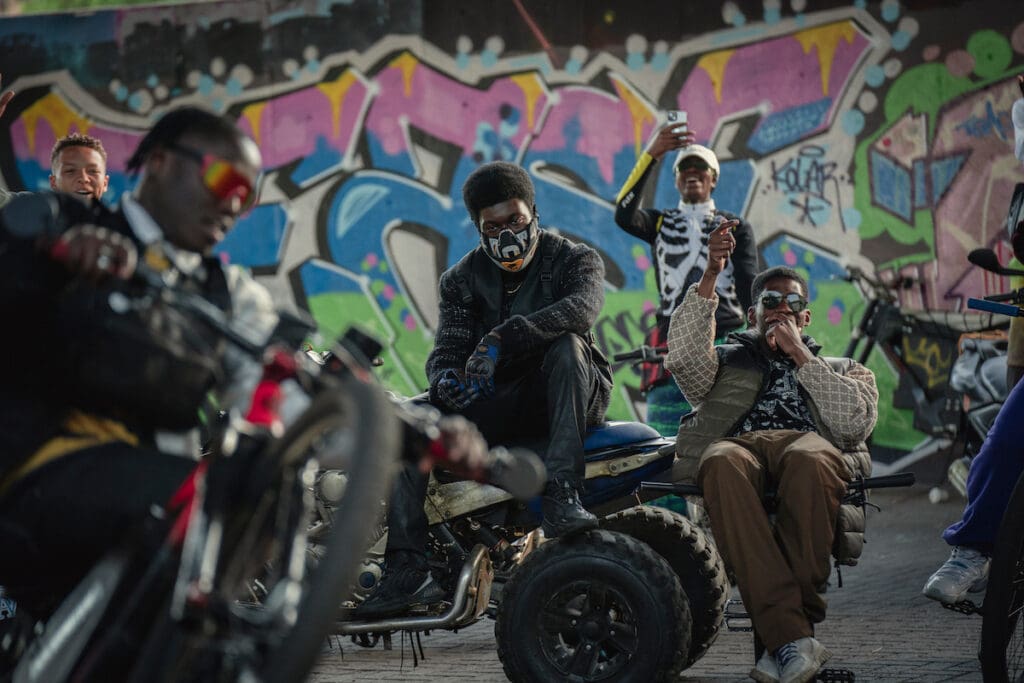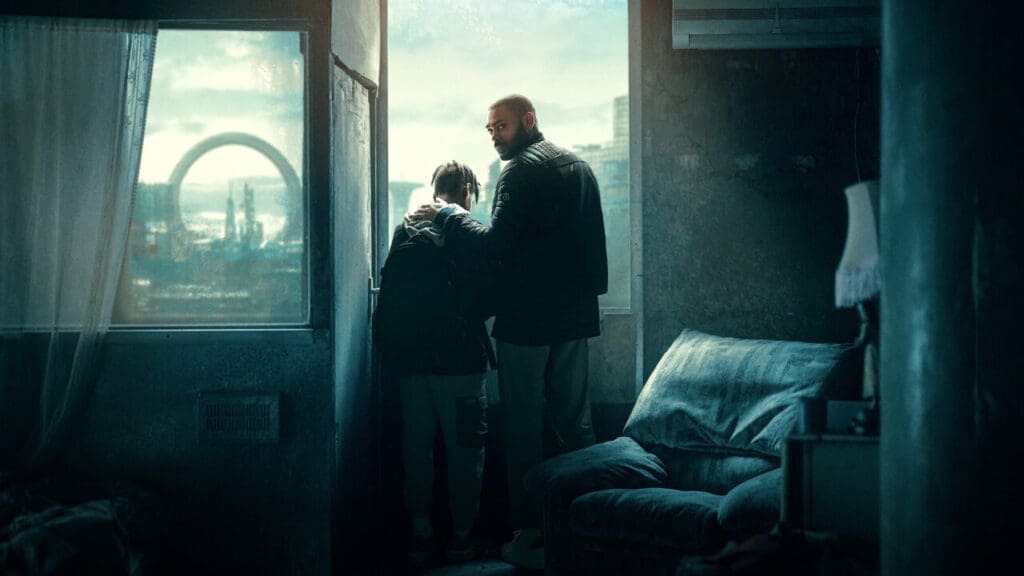Share this
Dystopian stories are nothing new but what matters is how one decides to go about telling the story in the first place. The audience will naturally ask who the characters are, what their motive is, what their world is like, and what stands in their way of achieving whatever goal they set for themselves. It’s not uncommon for films set in a dystopian society to take place in the distant future because frankly, who could ever imagine such things happening in our present-day world? But the fact of the matter is, like any work of art, these stories are far more inspired by events that have occurred as well as current day events than some may realize. Daniel Kaluuya and Kibwe Tavares’ directorial debut film on Netflix, The Kitchen, explores this exact thought.
The Kitchen is a British science-fiction film that takes place in a futuristic and dystopian London. The story follows two characters, Izi and Benji, who meet under unfortunate circumstances after Benji has lost his mother. With Benji hoping to find his biological father, he persists in staying with Izi in “The Kitchen”, the poor side of the city that is meant to remain uninhabited and is often subject to police raids. As tensions grow between the people and authorities, figuring out one’s place and true purpose grows difficult between Izi and Benji. The film stars Kane Robinson, Jedaiah Bannerman, Hope Ikpoku Jr, Teija Kabs, Demmy Lapido, and Ian Wright.
Read Also: ‘The Book of Clarence’ Stands Out With Its Comedic Mythological Vision

Art will always imitate real life, regardless of if it happened in the past or if it’s happening in real time. What’s important to note is that The Kitchen isn’t your average sci-fi film. It doesn’t take place in an orientalist cyberpunk city with fetishized robots. There’s no brooding main character who grapples with his role as an authoritative figure. There aren’t even robots that serve as a placeholder for those society deems inhuman or beneath humanity. In fact, the film strays so far from what we’ve seen in sci-fi and dystopian media that it ends up far more unsettling in the end the more it stays on your mind.
On the surface level, The Kitchen takes obvious inspiration of social justice issues, specifically that which pertains to aggressive police action, which is implied heavily in the film’s trailer. But digging deeper, there is also a discussion of displacement and the lack of welfare programs available to assist families that are below the poverty line and make little to no income. The Kitchen takes an inside look into what happens when the place you reside is no longer yours to call home, at least not legally. There’s a community that exists within the Kitchen but that doesn’t guarantee survival, and at some point, it nearly becomes every person for themselves.

With a character like Izi, played by Kane Robinson, there’s duality in a society such as the one portrayed throughout the film. What happens when you reach high enough to get out of the predicament and environment you’ve been stuck in for so long? Do you leave your community behind in search of a new start or do you remain in solidarity to care for those who aided you your whole life? Through Benji, played by Jedaiah Bannerman, these curious questions that plague the viewer become even more important as both Izi and Benji are now tied together by fate. The film keeps you engaged but on edge as you wonder what choices the main characters will make each step of the way toward the finale. And this is certainly a testament to the stoic and curious performances of Robinson and Bannerman whose chemistry exudes a very familial yet tense energy.
On the topic of community and familial relationships, the film also heavily focuses on the presence of immigrant families that come from all over the place, but specifically countries like Ghana or Nigeria. Despite the internal conflicts we see within the main character, there is still a connection amongst all the characters as they bring up universal experiences. One such example is the three week long Nigerian funeral brought up by an unnamed character, an experience which many immigrants and their children of varying cultures can relate to. It’s small details like this that make it obvious that this film isn’t about a big bad antagonist or a solo “gloom and doom” character. At its core, the film is instead about the people, the community, and the struggles they face on the inside of a system that tries to push them down and drag them out.

But with all its intricate themes and quiet yet compelling performances, the film feels just a bit lacking. It’s hard not to find yourself wanting to know more about the various characters we come across and there just isn’t enough time spent with them to fully understand their motives. On one hand, much of their backstories are implied, but on the other hand, it starves the viewer into wanting more from characters like Staples, a radical leader of a bike gang, or The Kitchener, an underground radio host whose identity is kept vague. Perhaps this is to keep us in a state of curiosity and intrigue, and to drive focus strictly onto Benji and Izi, but it doesn’t stop us wanting more. In the end, the film not only keeps us hungry for more but it also leaves us with a sobering feeling. We might not want to accept what the end result is, but deep down, we know what happens next.
Being that The Kitchen is the directorial debut of Kaluuya and Tavares, the film is still quite the knockout. It is full of mystery, fear, and somber moments as we see life through the perspectives of two people caught in unfortunate circumstances and living conditions. While the film could do with a slightly longer runtime to give the audience more time with the characters, it’s also worth noting that sometimes, the implications are all we need to finish the story ourselves. We know the outcome, and we know it because that’s our current reality.

After all, dystopian stories do not exist simply because we imagine that’s what could happen. Rather, it’s because it already has happened, whether we realize it or not, and whether it has been publicized or not. The Kitchen is a stunning film that offers commentary on the state of society and the lack of awareness that we oftentimes hold toward communities that experience little to no opportunities of moving up and out of the conditions into which they’re born. Meanwhile, the film also challenges our individualistic mentalities as it forces us to question what we think comes first: Ourselves, or humanity and community as a whole. The film reminds us that in the end, it’s never the answer to this question that is important, but rather the reasoning behind our answer.
Samosa Rating:
The Kitchen receives 4 out of 5 Samosas.
The Kitchen is now streaming on Netflix.
Runtime: 1h 47m
If you want even more film discussions, reviews, or just some good old recommendations, be sure to follow @samosasandpopcorn on TikTok!


